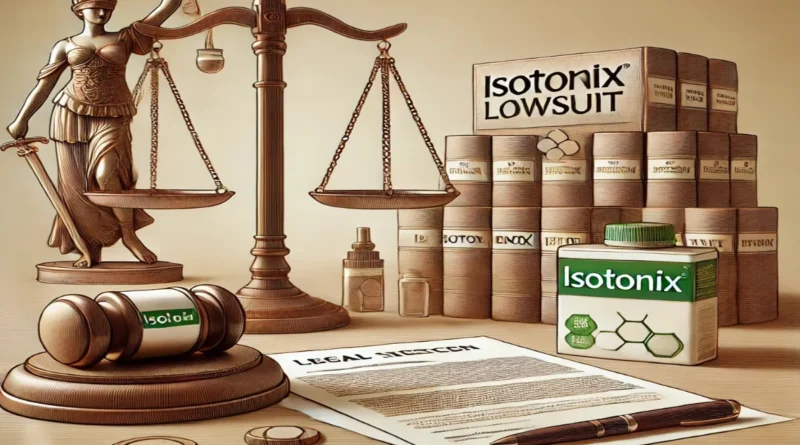The Isotonix Lawsuit: Dissecting the Legal Battle Over Supplement Claims

In the competitive world of dietary supplements, where product claims and advertising practices are under rigorous scrutiny, legal battles can have significant consequences. The Isotonix lawsuit, a high-profile case involving the popular supplement brand, has drawn attention for its allegations of misleading advertising and consumer deception. This article delves into the details of the lawsuit, explores the specific allegations, and examines the broader implications for the dietary supplement industry.
Background on Isotonix
Table of Contents
ToggleIsotonix, a subsidiary of Market America, has built a reputation for its innovative approach to nutritional supplements. The brand is known for its isotonic delivery system, which is marketed as a breakthrough in nutrient absorption.
**1. Product Claims and Innovation: Isotonix supplements use a delivery system that involves dissolving the product in water to create a solution that matches the body’s natural fluids. The company claims this process enhances the absorption of vitamins and minerals, making the supplements more effective than traditional pills or capsules.
**2. Market Position: The brand has positioned itself as a leader in the supplement industry by emphasizing the scientific advancements behind its products. This has helped Isotonix build a loyal customer base and establish a strong market presence.
The Lawsuit: Key Issues and Allegations
The lawsuit against Isotonix centers on allegations that the company engaged in deceptive marketing practices. The legal battle highlights several critical issues related to the brand’s advertising and product claims.
**1. False Advertising Claims: The plaintiffs in the lawsuit argue that Isotonix made exaggerated and unsubstantiated claims about the benefits of its isotonic delivery system. They allege that the company’s marketing materials misleadingly suggested that their products were significantly more effective than competitors’ supplements, without providing adequate scientific evidence to support these claims.
**2. Consumer Deception: The core of the lawsuit revolves around accusations that Isotonix deceived consumers into believing their products had superior health benefits. The plaintiffs claim that the company’s advertising created a false sense of efficacy and value, leading consumers to make purchases based on misleading information.
**3. Regulatory Compliance Issues: The lawsuit also touches on potential regulatory violations. The plaintiffs argue that Isotonix’s advertising practices may have breached federal regulations governing dietary supplements. These regulations require companies to provide truthful and non-misleading information about their products and to avoid making unsupported health claims.
Legal Proceedings and Developments
The legal proceedings in the Isotonix lawsuit have involved several key stages, including the initial complaint, discovery, and pre-trial motions.
**1. Filing and Complaints: The lawsuit began with the plaintiffs filing a complaint against Isotonix. In their legal filings, they outlined their allegations of false advertising and consumer deception. The complaint sought damages for alleged harm caused by the misleading marketing practices.
**2. Discovery Phase: During the discovery phase, both parties exchanged evidence related to the case. This included internal documents from Isotonix, marketing materials, consumer testimonials, and scientific studies related to the efficacy of the isotonic delivery system. Discovery is crucial for building each side’s case and preparing for trial.
**3. Pre-Trial Motions and Hearings: Pre-trial motions have addressed various legal issues, such as the admissibility of evidence and procedural matters. These motions help establish the framework for the trial and determine which evidence and arguments will be presented in court.
Broader Implications for the Dietary Supplement Industry
The Isotonix lawsuit has significant implications for the dietary supplement industry, highlighting key issues related to advertising, consumer protection, and regulatory oversight.
**1. Impact on Advertising Practices: If the court rules in favor of the plaintiffs, it could set a precedent for how dietary supplements are marketed. The case underscores the importance of accurate and substantiated product claims and may lead to stricter standards for advertising practices in the industry.
**2. Consumer Protection: The lawsuit emphasizes the need for robust consumer protection measures. Accurate labeling and honest advertising are essential to ensure that consumers make informed decisions about their health and wellness products. The case highlights the importance of transparency in marketing and the potential consequences of deceptive practices.
**3. Regulatory Oversight: The outcome of the lawsuit could prompt increased regulatory scrutiny and enforcement within the supplement industry. If Isotonix is found to have violated regulations, it may lead to more rigorous enforcement of existing laws and potentially new regulations aimed at preventing similar issues in the future.
**4. Industry Reactions: Other companies in the supplement industry will be closely watching the outcome of the Isotonix lawsuit. The case could influence industry-wide practices and lead to changes in how products are marketed and how claims are substantiated. Companies may adopt more conservative advertising strategies and invest in additional scientific validation to avoid similar legal challenges.
Conclusion
The Isotonix lawsuit serves as a significant case study in the complex world of dietary supplement marketing and consumer protection. The legal battle highlights the challenges companies face in ensuring that their advertising practices are truthful and compliant with regulatory standards. As the case continues to unfold, it will be closely watched by industry stakeholders, regulators, and consumers. The outcome could have lasting implications for how dietary supplements are marketed and the standards for advertising in the health and wellness sector. For now, the focus remains on the legal proceedings and their potential impact on the future of the supplement industry.













Post Comment